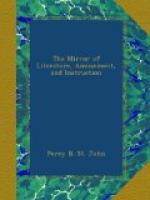“In the original cause of the misunderstanding, we must in justice give the right to the prisoner at the bar. He had acquired possession of the enclosure, by a legal contract with the proprietor, and yet, when accosted with galling reproaches he offered to yield up half his acquisition, and his amicable proposal was rejected with scorn. Then follows the scene at Mr. Heskett the publican’s, and you will observe how the stranger was treated by the deceased, and I am sorry to observe, by those around, who seem to have urged him in a manner which was aggravating in the highest degree.
“Gentlemen of the jury, it was with some impatience that I heard my learned brother, who opened the case for the crown, give an unfavourable turn to the prisoner’s conduct on this occasion. He said the prisoner was afraid to encounter his antagonist in fair fight, or to submit to the laws of the ring; and that therefore, like a cowardly Italian, he had recourse to his fatal stiletto, to murder the man whom he dared not meet in manly encounter. I observed the prisoner shrink from this part of the accusation with the abhorrence natural to a brave man; and as I would wish to make my words impressive, when I point his real crime, I must secure his opinion of my impartiality, by rebutting every thing that seems to me a false accusation. There can be no doubt that the prisoner is a man of resolution—too much resolution; I wish to heaven that he had less, or rather that he had had a better education to regulate it.
* * * * *
“But, gentlemen of the jury, the pinch of the case lies in the interval of two hours betwixt the injury and the fatal retaliation. In the heat of affray and chaude melee, law, compassionating the infirmities of humanity, makes allowance for the passions which rule such a stormy moment—But the time necessary to walk twelve miles, however speedily performed, was an interval sufficient for the prisoner to have recollected himself; and the violence and deliberate determination with which he carried his purpose into effect, could neither be induced by anger, nor fear. It was the purpose and the act of pre-determined revenge, for which law neither can, will, nor ought to have sympathy.
* * * * *
“The law says to the subjects, with a voice only inferior to that of the Deity, ‘Vengeance is mine.’ The instant that there is time for passion to cool, and reason to interpose, an injured party must become aware, that the law assumes the exclusive cognizance of the right and wrong betwixt the parties, and opposes her inviolable buckler to every attempt of the private party to right himself. I repeat, that this unhappy man ought personally to be the object rather of our pity than our abhorrence, for he failed in his ignorance, and from mistaken notions of honour. But his crime is not the less that of murder, gentlemen, and, in your high and important office, it is your duty so to find. Englishmen have their angry passions as well as Scots; and should this man’s action remain unpunished, you may unsheath, under various pretences, a thousand daggers betwixt the Land’s-end and the Orkneys.”




